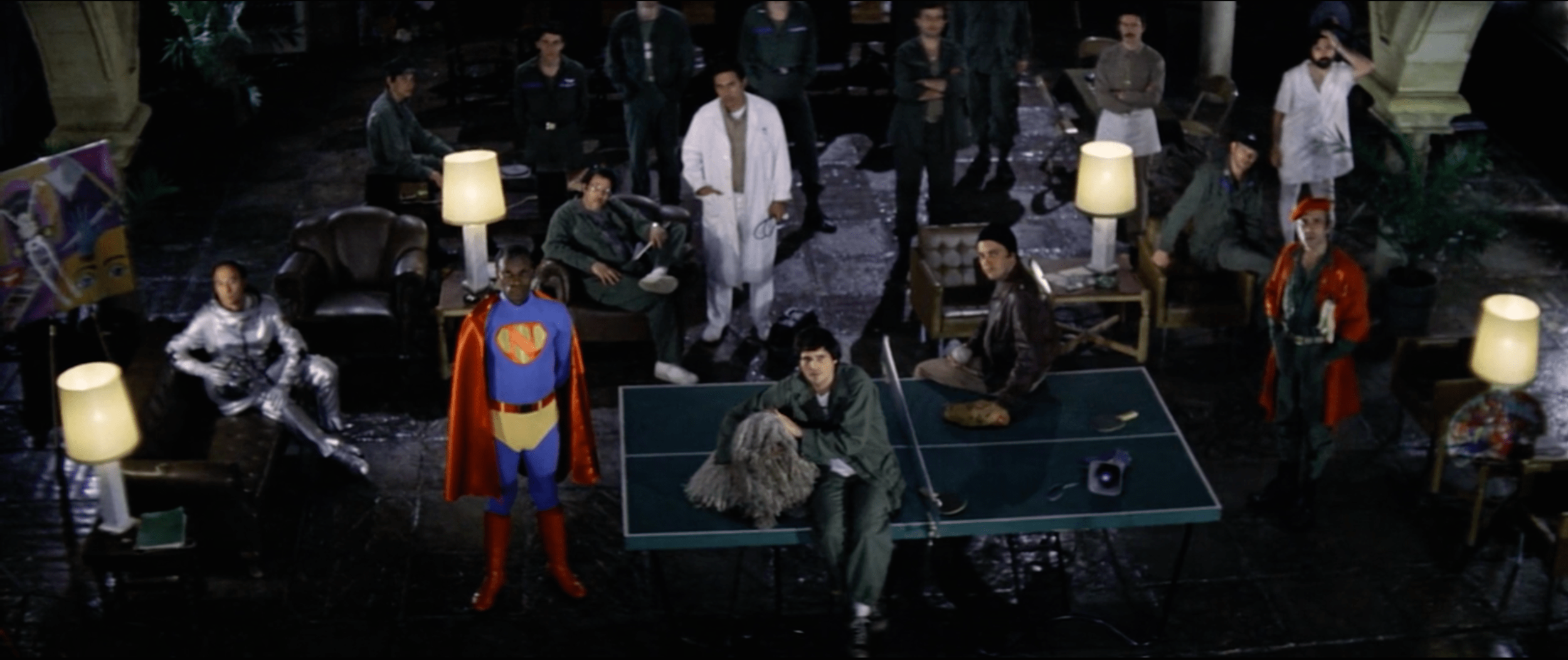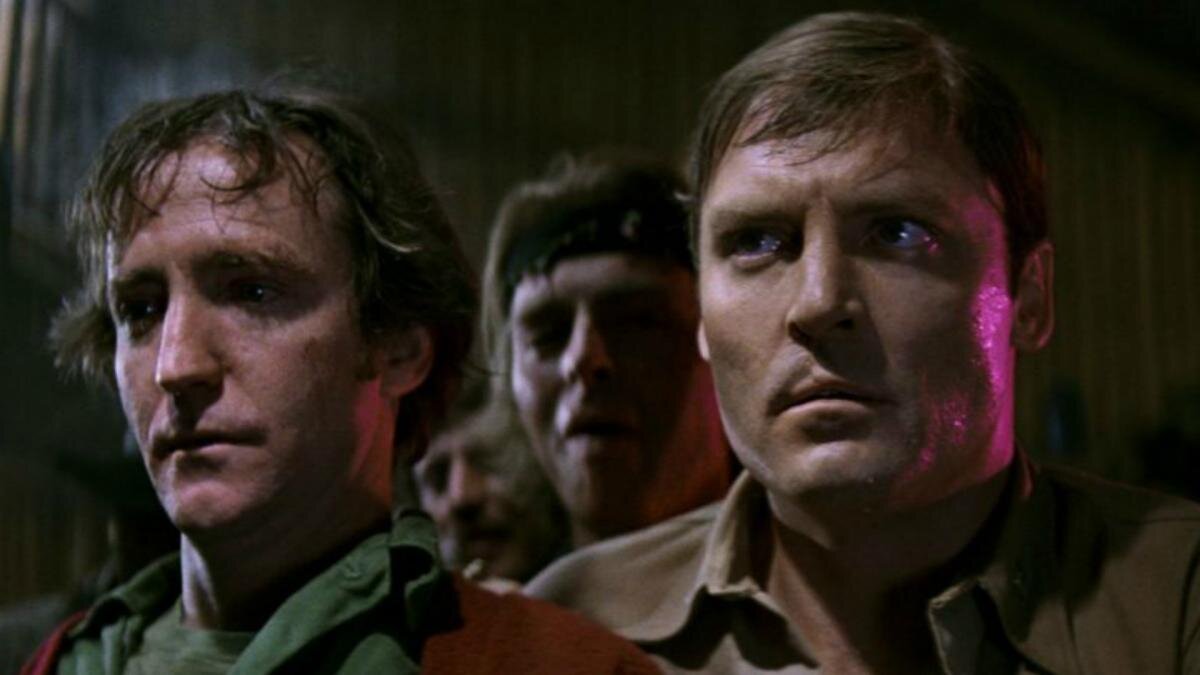Summary:
An isolated institution in the Pacific Northwest tries a controversial experimental treatment on its primarily Vietnam veteran population.
My Thoughts:
William Peter Blatty is the author behind “The Exorcist” and the writer and director of “Exorcist III”. This year, I watched “Exorcist III” for the first time and found I was rather impressed. While “III” didn’t even approach the level of brilliance in “The Exorcist”, it did provide a very compelling story, far more compelling than “Exorcist II: The Heretic”, and Blatty’s direction, while not wholly polished, was good enough to catch my attention. When I learned that Blatty had directed only one other film, and that film was, like “The Exorcist” and “Exorcist III”, based upon one of the author’s own novels, I decided to check it out.
As a side note, before we really get started, Blatty stated that this film is a pseudo-sequel to “The Exorcist”, for one of the asylum’s residents, Captain Cutshaw (Scott Wilson, “In the Heat of the Night”), is an astronaut; the same astronaut whom Regan warns “You’re gonna die up there,” during the party scene right before she pees on the rug.
“Lieutenant Reno is adapting Shakespeare’s plays for dogs.” “It’s a labor of love. A f*cking headache, but G*ddammit somebody’s got to do it.”
Col. Vincent Kane (Stacy Keach, “Nebraska”), a psychiatrist in the US Army, is sent to an isolated mental asylum to help a band of veterans whom all claim to have gone crazy around the same time. The US government is skeptical of their claims, so they begin to use experimental treatments that involve allowing the patients to act out their fantasies. Assisting Col. Kane in his work is Col. Fell (Ed Flanders, “The Exorcist III”), the psychiatrist who had been in charge before Kane’s arrival. Amongst the army vets is another resident whom hadn’t seen combat, but who had also experienced a sudden onset of psychosis: Captain Cutshaw, an astronaut who aborted his mission at the last moment.
Blatty and I are kindred spirits; he liked to ask the big questions, casting his bucket deep into the well of the metaphysical realm, knowing that there wont be any answers at the bottom of that deep dark well. Sometimes it’s necessary to ponder those big questions: why am I here? Is there a God, and if there is, why does he allow so much evil in the world? What is the nature of good and evil and how do the two correlate? If we’ve committed great evils can we be redeemed? These are the kinds of questions Blatty brings up with this weird and sometimes-surreal little drama. I loved those philosophical parts of the film, and were it not for a few incredibly weird tonal shifts, this movie would’ve received a far better score from me.
Another thing I really enjoy about Blatty is his direction. While I don’t think Blatty’s direction is as polished as Scorsese or Spielberg, Blatty is a man that really knows story, character, and how to infuse plenty of layers of metaphor into his scenes without them feeling too on-the-nose. His shots are never so technical that I’m blown away, but they are always competent, and better yet, he’s willing to take risks. Sometimes those risks pay off, and sometimes they don’t. There are a lot of surreal moments in this movie (scenes where astronauts find crucifixes on the moon or scenes where residents are trying to teach dogs Shakespeare) and many of those moments work to really elevate the film.
But there were a few moments that went just a little bit too far with the surrealism and waded into moments of lunacy, and those moments detracted from the film greatly. For example, near the middle there’s a scene when all of the residents begin to act out their fantasies, and one of the residents suddenly flies across the top of the frame with a jetpack. There’s no mention of where, how, or why he got this jetpack; it simply shows up for a single gag and vanishes for the rest of the film. It’s so absurd that I threw my hands up in astonishment and yelled, “What is this?” at the screen. There’s another scene towards the end of the film where a few of the residents get into a bar brawl, and that scene, while it was obvious Blatty was trying to create a kind of metaphorical pit in which the residents were trapped, was a bit much. The bikers that our heroes fight look so flamboyant that they look like a bunch of glam rockers- eye shadow and rhinestones included.
I wasn’t wholly satisfied with the ending of this movie either. I feel as if, for the most part, Blatty was fine with just raising metaphysical questions without ever giving a true answer, but at the end of the film, Blatty tosses that ambiguity out the window as an excuse to give us an ending that feels somewhat redemptive. I say somewhat, because in my opinion, the ending doesn’t feel fully earned; it feels rushed and honestly a bit hokey.
Verdict:
This is a weird movie, because on one hand, I freaking loved what Blatty was trying to say with his writing, but then with the other hand, Blatty undermined a bit of the great work he had put into this piece. As a whole, I think this movie is very watchable, and I think it has a couple of really, truly, fantastic moments in it, but I can’t give this anything more than a 3.5/5 because of the weird jetpack and glam rocker bikers.
Review Written By:







